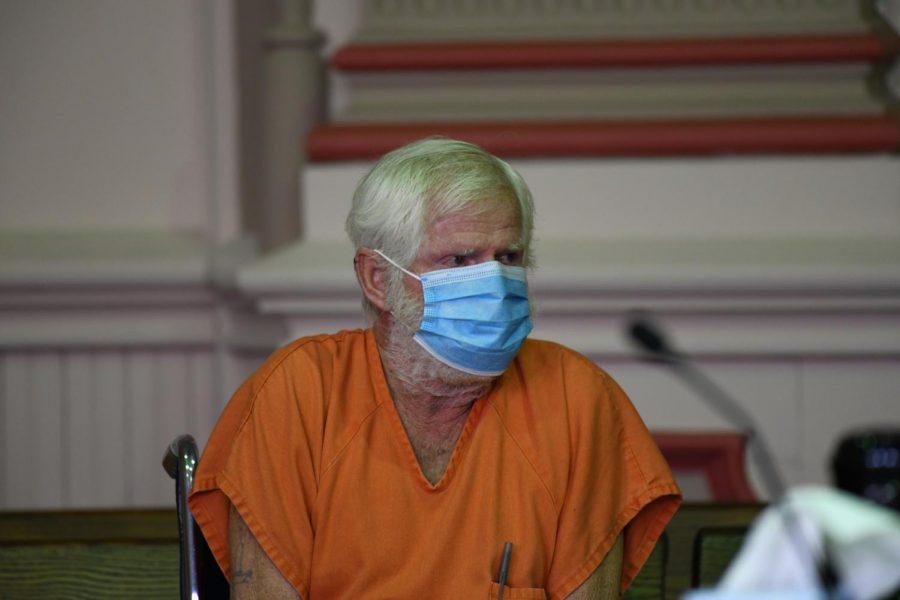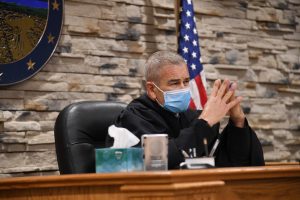Texas man gets 17 years for role in county’s largest trafficking case
August 10, 2020
A man who served as the go-between for local area drug dealers and Mexican cartels was sentenced Monday morning in what is being called the largest drug trafficking seizure case in Muskingum County history.
Ronald Cooper, 76, of San Benito, Texas appeared in court on two counts, trafficking of cocaine, a felony of the first degree and fabrication of a vehicle with a hidden compartment, a felony of the second degree.
As part of a previous plea agreement, prosecutors agreed to drop count two, possession of cocaine, in lieu of Cooper’s plea of guilty for the other two charges.
According to Assistant Prosecuting Attorney John Litle, while Cooper may look frail and elderly, he is a major drug trafficker with a criminal history dating back to the Johnson administration.
Litle explained that as part of the organization’s structure to limit exposure, Cooper was the only individual to have direct contact with Dwight Taylor, a local area drug kingpin, who is also being prosecuted as part of the drug seizure case.
Cell phone location records show Cooper traveled to many cities across the Eastern seaboard, from Minnesota to Texas and as far as New York and Flordia, something Litle called a fascinating trail of connections.
According to Litle, he wasn’t just a “passenger,” this was his profession, Cooper helped pump “poison into the streets.”
Litle reiterated that Cooper had been doing this for a very long time and highlighted the work of local law enforcement noting that the size of this case was truly remarkable for a county of its size.
Referencing the serious nature and impact Cooper had on the local community and likely many other communities, Litle asked the court to impose substantial consecutive sentences.
Cooper’s attorney, Amy Otto, argued that he played a “lesser,” role than his other codefendants, saying that he didn’t call the shots, didn’t own any companies or trucks and that in fact, he lived in a broken-down trailer with minimal income.
Otto also argued that Cooper didn’t hide any drugs in any vehicles and likely couldn’t find the hidden compartment even if asked to do so. Due to those conditions, Otto said the two charges were one of the same crime, and therefore should be merged.
In referencing Cooper’s criminal history, Otta referenced his youth growing up in an orphanage where he was badly beaten and abused.
Muskingum County Court of Common Pleas Judge Mark C. Fleegle began by addressing Cooper’s presentencing investigation, which showed a criminal history dating back to 1963 when he was charged with interstate transport and consequently served three years in federal prison at the age of 18.
Fleegle also highlighted that in 1967 Cooper was caught transporting illegal immigrants across the border for $300 dollars a person.
In 2005, Cooper was again apprehended for possession of 50 pounds of marijuana.
Fleegle said that Cooper had obviously been involved with criminal activity since at least 1963 and called out his attempt to downplay his role and economic status.
“Gasoline alone would have cost a fortune,” Fleegle remarked as he looked at a map produced by the Central Ohio Drug Enforcement Task Force of Cooper’s cell phone location activity over the past two years.
On count one, trafficking of cocaine, Cooper was sentenced to the mandatory minimum of 11 years and on count three, fabrication of a vehicle with a hidden compartment, Fleegle imposed 6 years, for an aggregate consecutive sentence of 17 years.
Cooper was also ordered to forfeit all items seized to the State of Ohio.

















